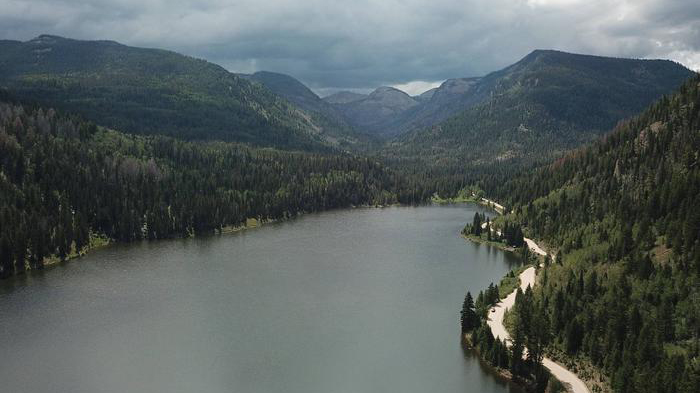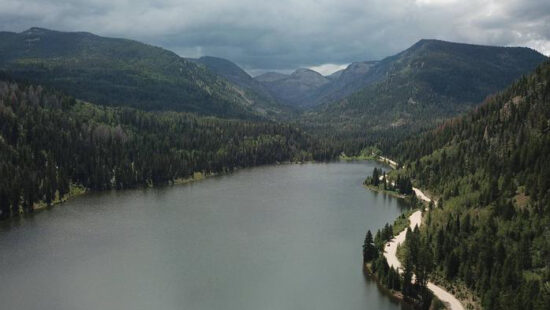Politics
Senate rules slow Mike Lee’s public land sale proposal as opposition surges

The Smith & Moorehouse reservoir located in Summit County is part of USFS Land that could be made available for sale as part of Sen. Mike Lee's provision that would mandate the sale millions of acres of land in Utah. Photo: Recreation.gov
A groundswell of opposition across the political spectrum continues to mount
PARK CITY, Utah — A sweeping public land sale proposal introduced by Sen. Mike Lee (R-UT) has run into a procedural hurdle in the U.S. Senate, complicating efforts to pass what could amount to the largest public lands divestment in American history.
The measure, included in a GOP budget reconciliation package, would authorize the sale of up to 258 million acres of Bureau of Land Management (BLM) and U.S. Forest Service lands across 10 Western states and Alaska. In Utah alone, more than 18.7 million acres — including lands in Summit and Wasatch Counties — could be affected.
However, the Senate Parliamentarian ruled that the land sale provision violates the Byrd Rule, a legislative test that prohibits major policy changes from being included in reconciliation bills, which require only a simple majority vote. As a result, Sen. Lee must now secure 60 votes instead of 51 to move the proposal forward—an outcome widely seen as less likely in the closely divided Senate.
View this post on Instagram
In response to the ruling and growing public opposition, Lee has reportedly begun revising the proposal to make it more appealing to a broader range of lawmakers. Sen. Mike Crapo (R-ID), who initially opposed the amendment, indicated his concerns were with the language at the time — suggesting he could support a revised version.
The original proposal excluded national parks, national monuments, and designated wilderness areas but did not specify which parcels would be sold. According to federal land maps, areas near Parleys Canyon, Mill Creek, the Uinta Mountains, and Albion Basin could be at risk if classified as “isolated” parcels.
A video released by Sen. Lee’s office stated the intent of the amendment was to identify and sell federal land suitable for housing or infrastructure development. It would also allow state governments to nominate parcels, with final decisions made in consultation with governors, local officials, and affected Native American tribes.
The land sale plan is part of a broader legislative package known as the “One Big Beautiful Bill,” which includes GOP tax cuts and other economic measures. Because the Parliamentarian flagged the land sale as policy—not budgetary—the proposal cannot be passed using the reconciliation process unless it is modified to meet Byrd Rule standards or passed separately with 60 votes.
Public opposition has been mounting since the amendment was made public, with conservationists, recreation groups, and elected officials voicing concern about the scale and speed of the proposed land divestiture. The public land sale also follows other actions taken earlier this year, including a federal court case filed by the state of Utah seeking control over 18 million acres of federal land.
Salt Lake City Mayor Erin Mendenhall on Monday voiced strong support for an emergency resolution introduced by Boise Mayor Lauren McLean at the U.S. Conference of Mayors. The resolution urged Congress to oppose the sale of federal public lands, citing threats to ecosystems, public health, and outdoor access—issues especially critical in Utah.
More than 100 organizations—including the Southern Utah Wilderness Alliance and the Center for Biological Diversity—have urged Congress to strip the land-sale measure from the budget package, calling it a direct threat to public access, responsible stewardship, and fragile Western ecosystems.
Meanwhile, Sen. Martin Heinrich (D-NM) raised concerns on social media that public land managers—including those at the Forest Service and National Park Service—are facing layoffs, which he linked to broader efforts to undermine federal land management and justify future land transfers to state control.
“They want to say that these lands aren’t being managed. Forget the fact that they just canned all the people who manage these lands so that they can transfer these lands to the state, so that the states can sell them off,” Heinrich said. “You don’t have to stand for this.”
View this post on Instagram
At a summit Monday of Western state governors, New Mexico Gov. Michelle Lujan Grisham said the approach is problematic in New Mexico because of the close relationship residents have with those public lands, according to an AP report published June 24.
“Our public lands, we have a very strong relationship with the openness, and they belong to all of us,” said Lujan Grisham, who was announcing written recommendations Monday on affordable housing strategies from the Western Governors’ Association. “And selling that to the private sector without a process, without putting New Mexicans first, is, for at least for me as a governor, going to be problematic.”
The Center for Western Priorities also published a collection of opinions from a wide range of opposers of Lee’s plan, including Republicans and right-wing influencers, highlighting the interest in public lands is popular across the political spectrum.
“Did Senator Mike Lee accidentally wake up a pro-public lands movement in the GOP?” the Instagram post made by the organization reads.
One of the personalities calling out Mike Lee is Benjamin Backer, author “The Conservative Environmentalist.”
“The American people aren’t rolling over. We have millions of Americans standing up and saying: this is not okay. Across the political spectrum, this isn’t even just an 80/20 issue — only 10% of Americans support the sale of this public land,” Backer said.
Sen. Lee has not yet introduced a revised version of the amendment.
Editor’s correction: Sen. Daines (R-MT) did not introduce the federal land sale with Sen. Lee. Daines’ serves on the Senate Committee on Energy & Natural Resources with Sen. Lee. Daines served as a moderator leveraging his influence to force significant narrow down of eligible parcels via negotiation.


















